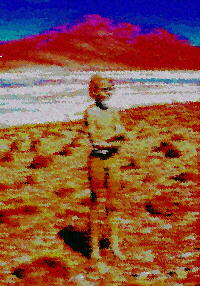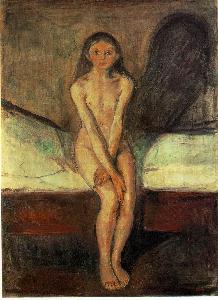Transitions
"Unless they are brought up in a family which accepts nudity, small children become savvy enough to realize that nudity is unacceptable and is even a source of embarrassment."

"The body itself is not wicked -- only the ways which it might be used to hurt others"

Very young children have no compunction about being nude. Often they will prefer this to the frustration of many a parent who must chase these naked sprites and keep them dressed. Depending on the way we are raised, this generally begins to change by the time a child reaches four or five. Unless they are brought up in a family which accepts nudity, small children become savvy enough to realize that nudity is unacceptable and is even a source of embarrassment. They take their cue from worried parents, disapproving onlookers and the derisive laughter of their peers. A whole network of reinforcing doubts corners the child into believing that his body is a source of shame that ought to be kept from view.
There are those, however, who seek to raise their children to view themselves differently. They realize that treating the body as an object of disgrace drives a wedge between a child and the very vessel of his life. The schism of such an attitude creates within children and adults a low-grade sense of self-loathing and unworthiness which can translate into a variety of problems within them and in their interactions with others. Those parents who are aware of the ramifications of this alienation try to find ways to relieve their children's concerns, and one important way is to allow nudity within the family or even among other families who are sensitive to these things. Nudism and naturism came about -- at least in part -- to stem or reverse the deterioration of humanity's estrangement from the human body. When children are raised with a sense that there's nothing fundamentally wrong with what they are, they have a better chance of avoiding the pitfalls of body loathing and fear which is so prevalent in our society.
But a time comes in the life of a child -- quite often even one raised with a healthy attitude about herself and her body -- when the opinions of others and certain doubts conspire to undermine her self-confidence. As a girl becomes more integrated into the society at large and begins to seek her place in it, she relies less on the support and beliefs of her family and more upon the views of those around her -- particularly her peers. At the same time she begins to experience a certain amount of anxiety about her transition to adulthood. She worries whether she'll be attractive to others and accepted into the group. Concerns about the shape and development of her body replace the more carefree attitudes of earlier childhood.
At this stage there is very little a parent can do to comfort or ease this transition for her son or daughter. The comforting wisdom of a mother or father cannot take the place of teenagers friends and the inordinate influence they have on his life. If he is surrounded by others who are embarrassed or titillated by nudity he will find it hard not to react the same way. Boys and girls both suffer from the comparisons that might be made concerning the rapidity of their physical development. They would prefer to be spared such ordeals if possible and shy away from circumstances where they might be made.
Even as young people emerge from this tumultuous period of their lives, the scars often remain. Being shunned -- or simply fearing ostracism -- leaves a legacy of uncertainty and a poor self-image. It has been said that modern society lacks a means by which it's younger members may smoothly incorporate themselves into the mainstream. Whereas rituals and observances of initiation -- often in the early teens -- were and are common in certain cultures, the amorphous realm of adolescent society which children must navigate places them in a kind of void where they neither belong wholly to their parents nor wholly to the world at large. This is unfortunate and a byproduct, perhaps, of the diminution of the role of communities and the domination of the nuclear family (versus the extended family and neighborhood). Children ought to feel that they belong to the world and are accepted by those around them so that when they stand on the threshold of adulthood they can assume their roles with little, if any, difficulty.
Part of the process of encouraging or maintaining this sense of belonging relies upon our teaching children to accept themselves and each other. We ought not label certain parts of our bodies as evil or treat them as though they are something that must be kept secret and covered out of a sense of shame. The body itself is not wicked -- only the ways which it might be used to hurt others. By distinguishing between those parts of us which have traditionally been viewed as impure and certain behavior which could be offensive under the wrong circumstances we make an important distinction that doesn't tar innocence with certain kinds of associated behavior. Such distinctions may be lost on most children and some adults as well. Accepting ourselves and our bodies as natural and neutral -- neither good nor evil -- helps younger minds see the difference between the body and the way it might potentially function.
With the loss of innocence and trust comes a loss of childhood. But how much of that loss is necessary, and how much takes place because we allow fear to dominate our lives? And what is the source of that fear but a falling away from the joy and sense of connection with our origins -- our own parents and the life force itself? The transition to adulthood is unavoidable and even essential. But the loss of all those positive qualities of childhood is nothing short of a tragedy. We must teach our children and ourselves to preserve or regain them or risk living a hollow, meaningless life of suffering and despair.